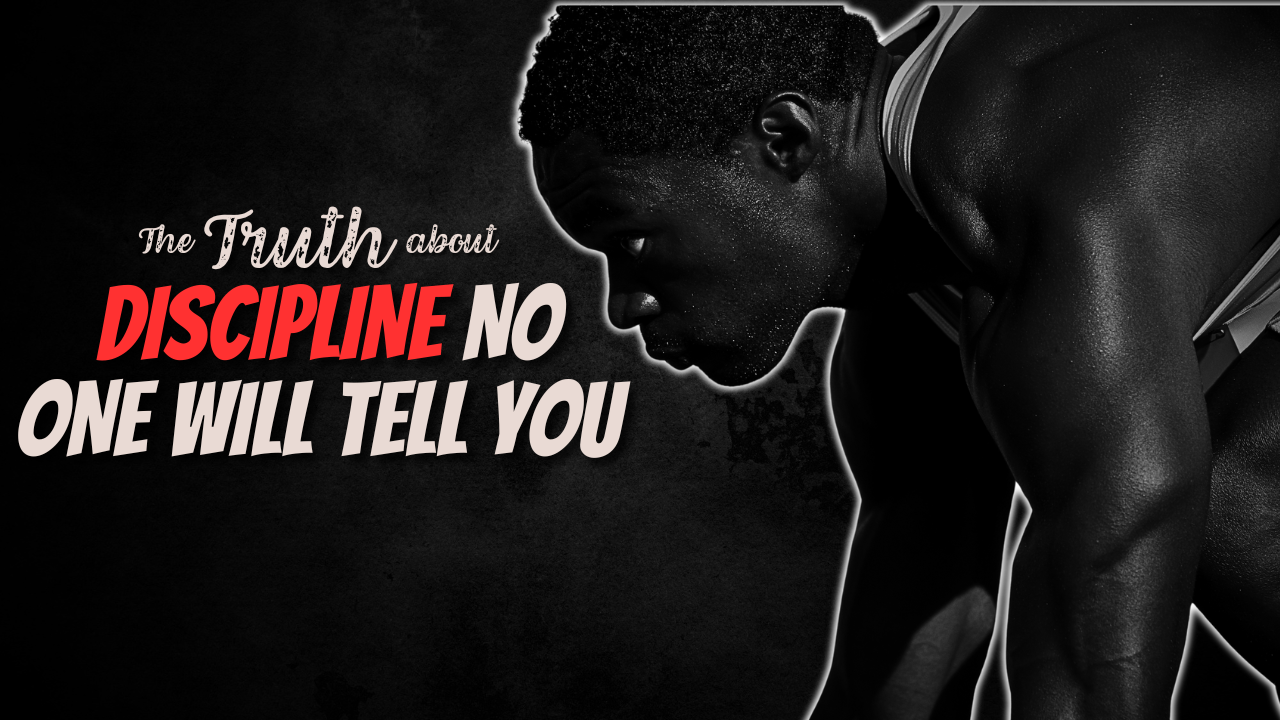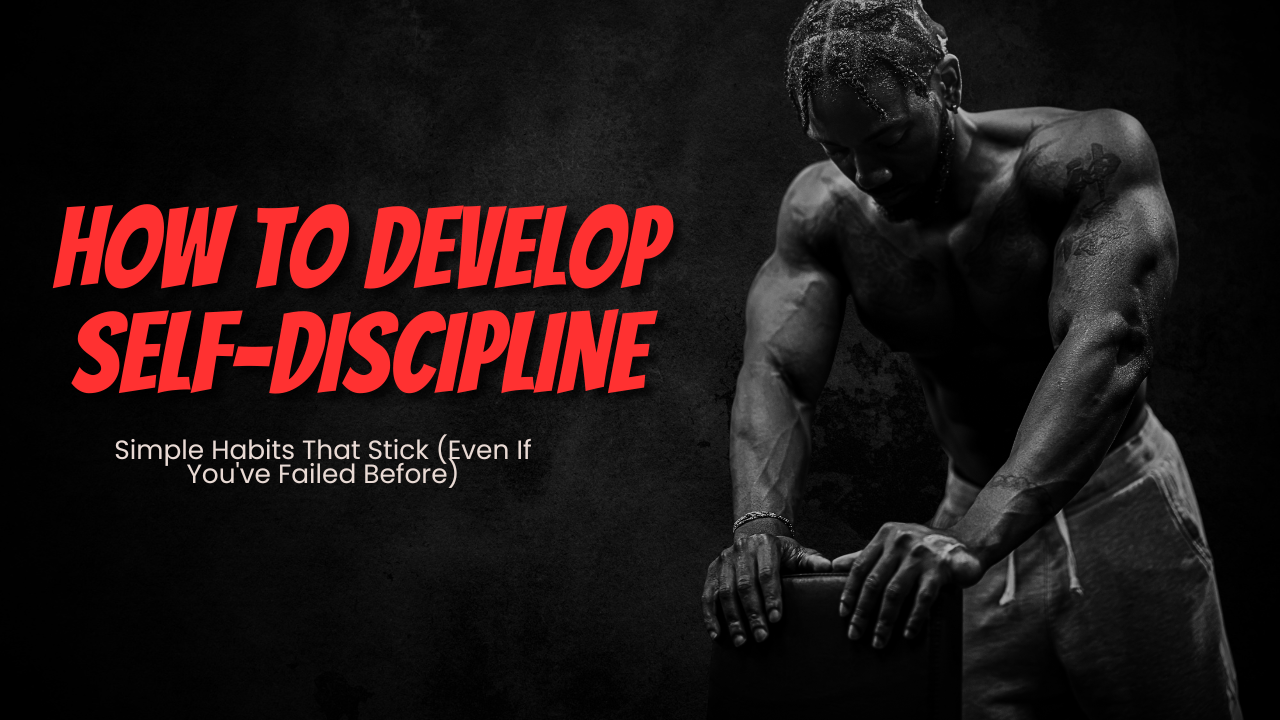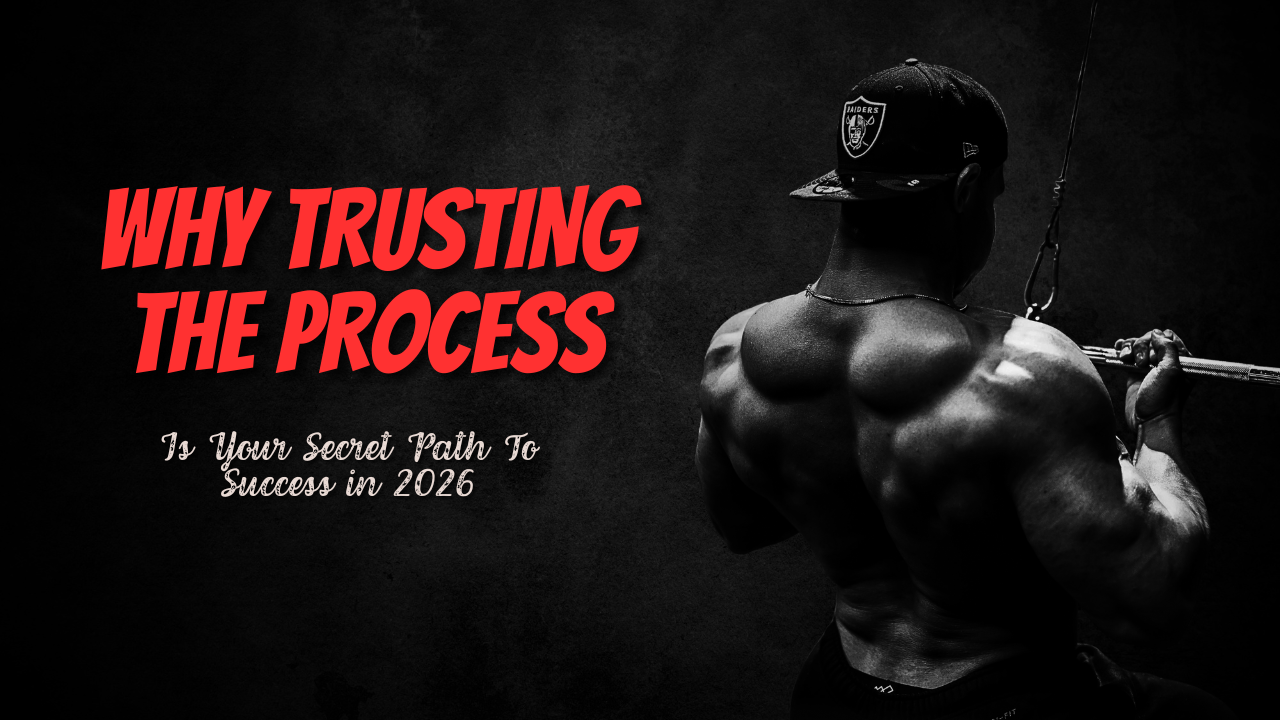Self-Discipline: How to Bulletproof Habits For Daily Mastery
Self-discipline isn't what most of us think it is.
We picture this whole gritted-teeth, white-knuckle thing — forcing ourselves through pure willpower.
But here's the thing: studies actually show that people with self-control are happier. Not more stressed. Not more restricted. Happier.
The truth is, people with higher self-control spend less time debating whether to indulge in things that don't align with their values.
They're not constantly wrestling with themselves. They're not white-knuckling their way through life.
Being self-disciplined isn't about controlling your mind or forcing yourself to override every uncomfortable emotion.
It's about realizing there's a life free from your old patterns. A life where discipline doesn't feel like discipline anymore.
What if building self discipline wasn't about fighting yourself but becoming more of who you truly are?
That's what we're talking about here — not another list of tips you'll forget by Thursday, but a path to habits that stick because they're actually you.
Self-Discipline Isn't About Control — it's About Becoming
Most people have self-discipline completely backwards.
They think it's about rigid schedules and depriving yourself of anything that feels good. Constantly fighting your natural inclinations like you're at war with yourself.
That's not self-discipline. That's self-torture.
What is self discipline really?
Think about someone you know who seems naturally disciplined. Maybe they hit the gym consistently, eat well, manage their time like a pro.
Are they grinding their teeth through every workout? Probably not. They've just become the kind of person for whom those behaviors feel normal.
Self-discipline isn't about controlling yourself through sheer force of will. It's about becoming the person who naturally does the things you currently struggle to make yourself do.
When you have to force yourself to do something, you're working against your current identity. But when an action flows from who you believe you are requires almost zero willpower.
If you see yourself as "someone who values physical strength," going to the gym isn't this thing you have to talk yourself into. It's just... what you do.
The struggle disappears when the action aligns with your self-image.
Why trying harder isn't the answer
"I just need more willpower."
Sound familiar? Yet here you are again — strong start, gradual decline, complete abandonment, shame, promises to "try harder next time."
Here's the thing about willpower... it's like trying to drive cross-country on a single tank of gas. You're gonna run out.
Research shows we have limited reserves of mental energy for self-control. Each decision depletes this reserve. By afternoon, you're running on fumes.
But here's the thing: the "try harder" approach completely ignores the underlying beliefs creating all that resistance in the first place. You can't outwork a misaligned identity.
The solution isn't more discipline through force. It's less resistance through alignment.
Some people seem to maintain discipline without struggle. They're not superhuman — they've just aligned their identity with their desired behaviors.
Self-discipline is evolution, not restriction. It's growing into the person who naturally does what the previous version of you had to force.
The question isn't "How can I make myself do this?"
It's "Who do I need to become so that this behavior feels natural to me?"
That shift... that's where everything changes.
Your Habits Are Just The Surface
Here's the thing about procrastination…
What you call laziness or lack of discipline, that's not your real problem. That's just what's showing up on the surface.
The real problem is deeper than procrastination
Procrastination isn't about poor time management. It's not even about being lazy.
It's about avoiding emotional discomfort. Research shows that procrastination is fundamentally an emotional regulation problem.
We delay tasks because they trigger things we don't want to feel — anxiety, self-doubt, that gnawing sense of "what if I'm not good enough?"
Your brain has one job: keep you safe from pain. When a task makes you feel inadequate or overwhelmed, your mind creates distance. And procrastination is just your brain doing exactly what it evolved to do.
Behind every avoided task sits an uncomfortable truth you're not facing. Maybe it's the fear that your work won't measure up.
Maybe it's anxiety that success might actually change things. Or maybe it's that quiet recognition that you're chasing someone else's version of success.
Researchers have found that procrastination often serves as self-protection. If you procrastinate and then fail, you can blame the lack of time instead of your abilities. Your identity stays intact… even as your goals slip away.
How to stop procrastinating by facing the root
The breakthrough happens when you realize procrastination is trying to tell you something valuable. Instead of fighting it, get curious about it.
Next time you catch yourself avoiding something, pause and ask:
What emotion am I dodging right now?
What story am I telling myself about this task?
What part of this actually makes me uncomfortable?
This creates a gap between impulse and action. And in that gap, you can choose differently.
Your procrastination patterns reveal your emotional blueprints. If you consistently avoid tasks with feedback or visibility, you're probably protecting yourself from judgment. If you delay difficult conversations… you're likely avoiding conflict or rejection.
The path forward isn't forcing yourself to "just do it." We already talked about how that doesn't work. The real solution is addressing the emotions driving your avoidance.
Try this: Instead of trying to overcome the discomfort, sit with it. Set a timer for ten minutes and face the discomfort of starting. As your brain realizes the work isn't actually dangerous, the resistance starts to fade.
You can't fix what you won't face
The most dangerous procrastination isn't putting off today's tasks. It's avoiding the uncomfortable truths about where your life is actually headed.
Most of us procrastinate on our biggest dreams because facing them would force us to confront our deepest fears. And honestly? That's terrifying.
Ask yourself: What are you really putting off? What dream would force you to grow beyond who you currently think you are? That's probably where your most significant procrastination lives.
Sometimes chronic procrastination signals you're chasing things you don't actually want — you just think you should want them.
When you're living someone else's life, procrastination becomes your subconscious rebellion.
Self-forgiveness matters here. Studies show that self-criticism actually increases procrastination, creating this vicious cycle. But self-compassion is what breaks the pattern.
Your procrastination isn't your enemy. It's a messenger showing you where growth is needed.
When you face what you've been avoiding, you don't just improve your habits — you reclaim your power to create the life you actually want.
Break The Belief System That Keeps You Stuck
Your beliefs about yourself are running the show behind the scenes.
Every time you think "I have no willpower" or "I'll never change," you're not stating facts. You're reinforcing a story that keeps you locked in place.
You're not lazy — you're running an old program
What you call laziness… it's actually your brain running outdated software.
Those persistent patterns of procrastination, giving up, avoiding difficult tasks, are not character flaws. They're programs installed by your past experiences.
Research shows traumatic life events can literally alter your brain structure, leading to poor self-control that persists decades later.
Studies reveal that experiencing a serious physical attack can reduce self-control by approximately 3.1% even 30 years after the incident.
Your childhood experiences particularly shaped your ability to regulate yourself. When parents fail to respond to their child's emotional needs — what psychologists call emotional neglect — the child never learns the two fundamental principles of self-discipline: making yourself do things you don't want to do and stopping yourself from doing things you shouldn't.
Here's the thing: your brain learned specific responses to protect you from pain. Now those same protective mechanisms are sabotaging your growth.
How to build self discipline by changing your story
To build genuine self-discipline, you have to recognize that your life is shaped by the stories you tell yourself.
As Maria Popova notes, "Our experience of the world is shaped by our interpretations of it, the stories we tell ourselves, and these stories can often become so distorted and destructive that they completely hinder our ability to live balanced, purposeful, happy lives."
The breakthrough comes through what psychologists call "story editing" — revising your personal narrative to create positive change:
Identify your current story - What labels do you give yourself? ("I'm not disciplined," "I always quit")
Question those beliefs - Ask yourself: "What if I'm wrong about this?" "Is this really true or just familiar?"
Create a redemptive narrative - "People who tell redemptive stories (finding meaning in difficulties) build greater confidence and hope."
Stop letting your past write your future
Your past has shaped you. But it doesn't define your future unless you let it.
At this point, you have a choice. You can continue believing you're "just not disciplined," or you can recognize this as an old story that no longer serves you.
Taking ownership of your narrative isn't about denying difficulties — it's about finding resilience through them.
The truth is, you don't need more willpower. You need a new story. One that acknowledges where you've been but focuses on who you're becoming.
Build From Integrity, Not Pressure
Here's what nobody tells you about discipline through force: it always falls apart eventually.
Most high achievers figure this out the hard way — after hitting every metric, checking every box, and still feeling completely empty inside.
Discipline without alignment leads to burnout
Hustle culture loves to glorify productivity while completely ignoring what's happening to your emotional well-being.
The World Health Organization literally recognizes "burnout as a syndrome caused by unmanaged chronic stress."
You can hit every single goal and still feel like you're losing if your internal world is unraveling.
Most driven people get obsessed with the physical things — overtraining, under-recovering, chasing numbers on a spreadsheet.
And… this approach backfires. Studies show overtraining syndrome leads to fatigue, mood issues, and injury.
Your systems either support your growth or they sabotage it. There's no middle ground.
Discipline without balance isn't discipline at all. It's self-destruction wearing a productivity mask.
What it means to live from integrity
Integrity comes from the word "integer" — meaning whole and undivided. Living with integrity means your thoughts, feelings, and actions stand united like a tripod. When these three elements align, you feel strong and confident.
This isn't about being perfect. It's about being consistent.
Living from integrity is about harmony with yourself — where your thinking, feeling, and acting sync up.
This creates an inner sense of wholeness that makes discipline feel natural rather than forced.
How to be more disciplined and consistent without force
Self-discipline comes from alignment, not aggression. When your actions match your values, discipline shifts from burden to rhythm.
You don't push to keep up. You commit because it supports your vision.
Start by identifying your core values. Self-control is more sustainable and effective when aligned with our values. The motivation becomes intrinsic rather than something you have to manufacture every morning.
Try saying "I don't" instead of "I can't" when you're tempted. This simple language shift can put you back in the driver's seat.
And remember — discipline built on consistency outlasts discipline built on perfection. You don't break down when you miss a day. You simply return and try again.
Again and again.
When your discipline flows from who you truly are — not who you think you should be — you'll find yourself naturally doing what others have to force themselves to do.
Create Habits That Match Who You're Becoming
Your habits are basically statements about who you think you are.
Every time you follow through — even on the tiny things — you're casting a vote. Not for productivity, but for identity.
Use habit stacking to reinforce your identity
Habit stacking isn't some productivity hack. It's identity reinforcement disguised as convenience.
You attach a new behavior to something you already do without thinking. After your morning coffee, immediately write three goals for the day.
Before checking social media, do ten pushups. When you finish a meal, prep your next healthy one.
This isn't about the coffee or the pushups or the meal prep.
It's about becoming someone who claims ownership of their time. Someone who controls their impulses instead of being controlled by them. Someone who honors commitments to themselves.
Your environment either makes showing up inevitable or keeps you stuck in old patterns.
Most of us are designing our days around who we've been instead of who we're becoming.
Habit stacking examples that actually work
The magic isn't in the specific actions — it's in what they represent.
After your morning coffee, write three goals for the day. You're not just planning. You're proving you're the kind of person who takes ownership of their time.
Before opening social media, do ten pushups. You're not trying to get jacked from ten pushups. You're establishing that you run the show, not your phone.
When you finish eating, immediately prep your next healthy meal. It's not about the food prep. It's evidence that you're becoming someone who keeps promises to yourself.
Each small action builds the bigger story.
How to build self discipline for success — one rep at a time
Self-discipline isn't built through occasional heroic efforts.
It's forged through choices so small they seem insignificant. The power isn't in the individual push-up or the single healthy meal. It's in never breaking the chain.
You're not just building habits. You're building yourself.
One choice at a time. One day at a time. One rep at a time.
Small, consistent actions create momentum that becomes unstoppable. Not because the actions themselves are powerful, but because of who you become through the process of showing up.
Conclusion
Here's what changes everything…
Self-discipline stops being a battle the moment you realize you're not fighting yourself anymore. You're becoming yourself.
Most of us have been trying to force our way into discipline through sheer mental toughness. White-knuckling our way through habits that feel foreign.
But your habits don't lie. They reveal exactly who you believe yourself to be right now.
True mastery isn't about gritting your teeth harder. It's about rewriting the story you tell yourself about who you are.
When discipline flows from integrity instead of external pressure, it stops feeling like discipline at all.
You already have everything you need to build habits that stick. Every small choice is a vote for your future self.
And eventually — quietly, without fanfare — what once took tremendous effort just becomes who you are.
Self-discipline isn't about being perfect. It's about coming back. You'll mess up. You'll face resistance. You'll have days when motivation completely abandons you.
What's the difference between people who stay stuck and people who break through? They keep showing up anyway.
Stop waiting to feel ready.
Start acting like you already are the person you're becoming. One choice, one habit, one small win at a time.
This isn't about controlling yourself through force — it's about becoming so aligned with your values that discipline becomes your natural way of being.











Discover the surprising path to self-love that nobody talks about. Learn to transform your inner dialogue, build genuine self-compassion, and reconnect with who you really are.